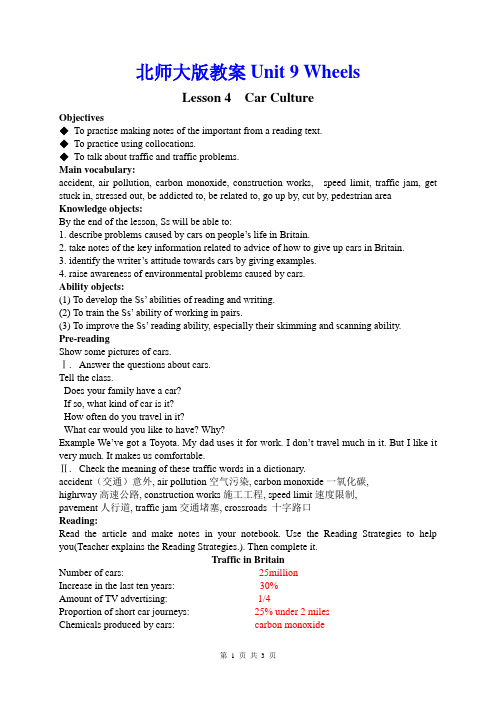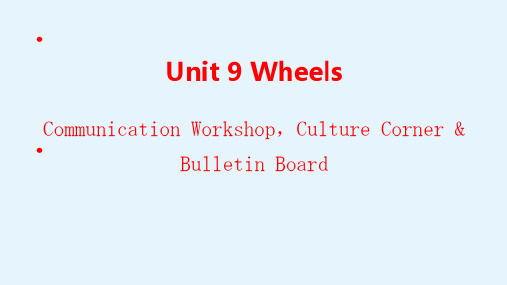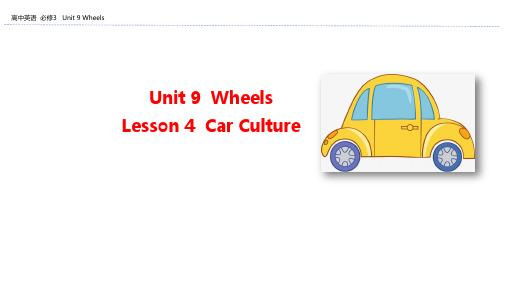北师大版高中英语必修3 Unit 9《Wheels》(Car Culture)ppt课件
北师大版高中英语必修三Unit 9 Wheels 重难点知识点总结

35.accent /'æksənt/ n.重音;口音
36.interpreter /ɪn'tɜːprɪtə/ n.译员;口译者
37.likely /'laɪklɪ/ adj.可能的
38.schedule /'ʃedjuːl/ n.时间表;进度表
6.jam /dʒæm/ n.阻塞,拥挤
7.actually /'æktʃʊəlɪ/ adv.实际地;真实地
8.benefit /'benɪfɪt/ n.得益,好处
9.flat /flæt/ adj.平坦的
10.convenient /kən'viːnɪənt/ adj.方便的,便利的
11.therefore /'ðeəfɔː/ adv.所以,因此
84.plus /plʌs/ prep.加,加上
44.case /keɪs/ n.大箱子
45.suitcase /'sjuːtkeɪs/n.手提箱;皮箱
46.content /kən'tent/ n.内容
47.petrol /'petr(ə)l/ n.solar /'səʊlə/ adj.太阳的;太阳光的
72.per /pə/ prep.每;每一
73.centigrade /'sentɪɡreɪd/ n.摄氏(度)
74.addicted /ə'dɪktɪd/ adj.沉溺于……的
75.admit /əd'mɪt/ v.承认,供认
76.occupy /'ɒkjʊpaɪ/ v.居住;占有
77.somehow /'sʌmhau/ adv.以某种方式
北师大版英语必修三Unit9Wheels说稿

词汇复习
三、操练巩固 原因:词汇梳理的基础上,巩固对 词汇意义和形式的理解和记忆 形式:英译汉和汉译英词块,在词 块中复现词汇,深化词汇搭配意识, 铺垫知识运用
词汇复习
四、词汇运用 形式:词汇运用(一):根据首字母、 单词或汉语提示填空。(单句语境)
词汇运用(二):用所给词或词组的 适当形式填空。(单句语境)
高中英语课件
(金戈铁骑 整理制作)源自Unit9 Wheels北师大三附中 2013.9.17
Unit9复习思路
一、词汇:借词汇促读写,以读 写巩固词汇 二、语法:系统学习中对比运用 链接高考 三、话题阅读:围绕wheels进行 扩展阅读,链接高考
词汇复习
一、课文回顾: 原因:语境让词汇复习自然;话题 使词汇集中,便于提取应用
词汇运用(三):完形填空。话题词 汇复现于相关语篇,综合能力训练。 原因:形式变化维持学生兴趣; 难度提升,促进能力提高
词汇复习
五、翻译句子 形式:汉译英,关键词提示
原因:单句输出,难度提升,词汇 促写作,写作中巩固词汇运用
词汇复习
六、根据本单元所学词汇写作。 形式:控制性写作——段落汉译英 原因:以写作固词汇运用,提高学 生语篇意识;关注行文细节,为非 控制性写作打基础
原因:使学生对话题wheels的认知更具发 散性和深刻性。
复习宗旨
1.清晰的课时目标。 2.具体的落实措施。 3.检测学生落实的手段。
语法复习
一、现在完成时和现在完成进行时
详解及对比
二、两种时态的当堂反馈练习:
补充句子、选择题
三、综合练习:高考链接——近4年 时态和语态高考题,所有的答案都 在原题标注,红笔标注的答案为本 单元所复习的时态题目
高中英语必修3北师大版Unit9Wheels单元知识系统回顾

Unit 9 WheelsⅠ. 重点词汇1. benefit n. 好处,益处,帮助v. 有益于,受益,得到好处benefit from 从……中受益for sb.'s benefit=for the benefit of sb. 为了某人的利益,为了帮助某人beneficial adj.有益的be beneficial to=be of benefit to 对……有益2. therefore adv. 因此,所以3. convenient adj.方便的,便利的It be convenient (for sb.) to do sth. (某人)做某事很方便...be convenient for/to sb.对某人来说……是方便的convenience n.方便;便利at sb.'s convenience 在某人方便的时候for sb.'s convenience(=for the convenience of sb.)为了某人方便4. consequence n.后果,结果in consequence 因此as a consequence of 作为……的结果,因为……consequent adj.作为结果的,随之发生的5. arrest vt. & n. 逮捕,拘留arrest sb. for sth. 由于某事逮捕某人make an arrest 逮捕place/put sb. under arrest 逮捕某人6. argue vi. 争辩,争吵,表明argue for sth. 为支持……而争论argue against sth. 为反对……而争辩argue about 就……而争论argue with sb. about/over sth. 因某事和某人争论argue that...主张……;坚持认为……argue sb. into/out of doing sth.说服某人做/不做某事7. sensitive adj.敏感的,能理解的be sensitive to sth. 对……敏感的be sensitive about/to 易生气的;介意的sensible adj .明智的8. likely adj .可能的be likely to do sth. 有可能做某事It is likely that...有可能……9. schedule n .时间表;日程安排 vt .安排;预定ahead of schedule 提前behind schedule 晚于预定时间on schedule 准时,按时间表be scheduled for... 预定……be scheduled to do... 预定做……10. responsibility n . 负责,责任,职责take responsibility for 为……承担责任responsible adj . 有责任的;负责的;可靠的responsibly adv .负责地;可靠地11. content n .容量,含量(pl.)内容,目录 adj .满足的,满意的 v .满足 be content with sb./sth.对……感到满足be content (for sb.) to do sth.满足于(让某人)做某事,乐得(让某人)做某事12. impression n .印象,感觉make/leave a good/bad/lasting impression on sb.给某人留下好的/坏的/永久的印象make no impression on sb. 对……没有影响(作用)⎭⎪⎬⎪⎫have a...impression of sb./sth.have the impression that...对……有……印象 impress vt .给……极深的印象13. reliable adj .可靠的unreliable adj . 不可靠的,靠不住的reliability n .可靠性14. appreciate v .欣赏,鉴赏;感激,感谢;察觉到,意识到appreciate (sb./one's) doing...感激某人做某事appreciate it if...如果……,……将十分感激15. amount n .数量 vi .合计,等同⎭⎪⎬⎪⎫a large amount of large amounts of 许多in large/small amounts 大量地/少量地16. figure n.数字;身材;人物;图画vt.计算;估算figure out 计算出;弄懂;领会keep one's figure 保持体形have a good figure 身材好17. admit vt.承认,供认;容纳;准入admit...to/into 允许……加入/进入……be admitted to/into... 被……接收admit (to) sth.承认……admit (to) doing/having done sth. 承认做过某事admit that...承认……admit sb./sth. to be...承认某人/某事……18. addicted adj.沉溺于……的be addicted to 对……上瘾addiction n.入迷,瘾19. occupy vt.居住;占有;占领;占用(时间、空间等)occupy oneself in (doing)/with sth.忙于(做)某事be occupied with/in doing sth.从事某事,忙于做某事20. somehow adv.以某种方式;由于某种原因;不知为什么;不知怎么地21. whichever pron.无论哪个22. suit vt. 适合suit sb. (fine)(很)合某人的意,对某人很合适suitable adj.合适的,适合的,适宜的be suitable to do sth./for sth.适合于……23. damage vt. & n.损失,破坏do/cause damage to 对……造成损害24. nowhere adv.无处,任何地方都不nowhere near 远远不/没有,完全不/没有25. frequent adj. 经常的,频繁的frequently adv.经常地,频繁地frequency n.频繁,频率Ⅱ.重点句型1. wherever作连接副词,引导地点状语从句,还可引导名词性从句。
【精选】_高中英语Unit9WheelsLesson4CarCulture课件北师大版必修3

-7-
课课前前篇篇 自自主主预预习习
课堂篇 合作学习
ห้องสมุดไป่ตู้
四、阅读课文第二部分,填写下面的表格
Jenny Trowe’s Advice on How to Solve Traffic Problems
What to do What you get
Walking
Taking buses Thinking twice Sharing cars
-3-
课课前前篇篇 自自主主预预习习
课堂篇 合作学习
8.Tick which description you think applies to each line.
I like/would like to walk or cycle to school because... ♣It is close to where I live. □ Yes □ No □ Maybe ♣It saves me money. □ Yes □ No □ Maybe ♣It enables me to travel with friends. □ Yes □ No □ Maybe ♣It helps to make the area more attractive. □ Yes □ No □ Maybe
Lesson 4 Car Culture
-1-
课课前前篇篇 自自主主预预习习
课堂篇 合作学习
一、下面是关于上学交通方式的调查,请如实填写并与同学分享 1.The street and area where you live: 2.Are you:□ male □ female 3.How old are you? 4.How far do you travel to school? □ Up to half a kilometer □ Between half a kilometer and one kilometer □ 1-1.9 kilometers □ 2-2.9 kilometers □ 3 kilometers and over
英语Unit9Wheelslesson4CarCulture北师大版必修3

4. What does Jenny Trowe think about car advertisements on TV?
They present an untrue picture of driving and cars.
crossroad
Prediction by the title. What’s the meaning of the title? If you are the writer, what will you talk about?
The road to Destruction
Bus /subway
Lesson 36 Car Culture
the problems caused by cars
Traffic Words
traffic jam
carbon monoxide air pollution
construction works
High way
Speed limit
pavement
Which sentence below best summarizes the writer’s attitude to cars?
1. He thinks they have more disadvantages than advantages.
√2. He knows what he should do, but uses his car because it is convenient. 3. He thinks it would be easy for us all to use our cars less.
2018-2019学年北师大版英语必修3课件:Unit 9 Wheels-6

Before 1908,when Ford's cars became available to
the public, it was only the very rich who could afford to own a car.
②
Ford found a way to massproduce the motor car
北师大版 ·英语必修3
进入导航
Unit 9 Cultural Corner and Bulletin Board
系列丛书
20 世纪 30 年代, 美国人想得到除福特 T 型车外更多的 东西。他们希望汽车不仅仅是实用,他们希望汽车看起来更 加漂亮一些。 不久像福特这样的汽车公司被迫改变了他们的 产品以适应公众的需求,时髦的汽车在美国变得流行起来。
系列丛书
1908 年,福特开始福特 T 型发动机车的生产,这种福 特 T 型发动机车将会永远地改变世界。福特 T 型发动机车 是世界上第一批被大量生产的汽车。1908 年以前,当福特 的汽车面向公众时,只有富人才能够负担起拥有一辆汽车。 福特找到了一个可以便宜地批量生产汽车的方法, 从而使更 多人拥有汽车成为可能。福特 T 型车简单、实用、价格低 廉,这是一个巨大的成功。在 1908 年到 1927 年间,福特制 造和销售了超过 1.8 千万福特 T 型车。
Cadillac,based their designs on airplanes. 到 20 世纪 50 年代,具有许多有趣味设计的汽车被生产 了出来。一些汽车公司,像卡迪拉克,把他们的设计建立在 飞机设计基础上。
北师大版 ·英语必修3
进入导航
Unit 9 Cultural Corner and Bulletin Board
英语知识点北师大版高中英语必修3 Unit 9《Wheels》(Communication Workshop)word教案-总结

Unit 9 WheelsCommunication Workshop教案Objectives■To practise making notes of the important information from a reading text.■To practise using collocations.■To prepare for a speaking activity and to participate in discussion.■To discuss suggestions.■To write a report.■To use addition and contrast linking words.■To listen to and understand a song.Resources usedCassette, Writing Help 3.BackgroundJohn Denver (1943-1997) was a popular country and folk singer. He wrote and sang many worldwide hits (including Leaving on a Jet Plane) and his albums sold millions. He also did a lot of charity work for underprivileged children and campaigned for ecological causes. He died in a plane crash.Routes through the material. If you are short of time, set some of the written exercises for homework.. If you have time, do the Option Activity.. If you have two lessons for this unit, a suitable natural break is after the Speaking activity.Language Power: pages 86-87.Speaking: A DiscussionBefore you startExercise 1■ Advise students to read through the text quickly to get a general idea of the content before filling in as many gaps as they can.■ Students compare their answers in pairs before listening to the cassette to check their answers.Answers1 main2 through3 accidents4 lorry5 pollution6 dirty7 damaged 8 traffic jam 9 park 10 shoppersTapescriptPresenter: And here is this week's County Report. At a council meeting yesterday, Ludford's traffic problems were discussed. The main problem is the A49 road, which goes right through the town.There have been several serious accidents recently―last week two children were killed by a lorry near the school. A report last year also showed that air pollution from traffic is increasing and the old buildings in the town are getting dirty and damaged.There is a terrible traffic jam every morning at Ludford Bridge and there’s nowhere to park in the centre. Because of the traffic, shoppers are going to other towns and local shops are closing down.Exercise 2■ Students work in pairs, studying the map and matching the words to the numbers on the map.Answersa) 3/4 b) 7/8 c) 5/6 d) 1/2Exercise 3■ Give students time to read through the expressions and the Function File and guess where the expressions fit into the sentences.■ Students listen to the cassette and complete the Function File, checking their guesses. Answers1 should2 sure3 would4 Why don’t5 good idea6 how about7 don’t think8 What aboutTapescriptGirl: So, what do you think about all these new plans for the town? Personally, I think they should build the bypass. It would get the traffic out of the town.Boy: I’m not so sure. It would be very expensive and it would take a long time. It’s also not very ecolo gical. Think about the wildlife. Why don’t they improve the bus service? It’s not very good at the moment. More people would use the buses if they were cheap and came regularly, and there would be less traffic.Girl: That’s a good idea. The buses are terr ible at the moment. You have to wait ages. Boy: Mm, I know.Girl: And how about building a shopping centre? The nearest one’s miles away.Boy: I don’t think that’s a very good idea. What about the local shops? What would happen to them? And anyway I hat e those big shopping centres …Stages 1-4■ Students follow the four stages to decide on the best plan for Ludford.■ In pairs, students read the Strategies.■ Students then work in pairs listing the advantages and disadvantages of the four plans (a?Cd) in Exercise 2.■ The pairs then decide on their plan. Tell students that their plan can include their own ideas as well as the ones given in Exercise 2.■ In groups of four, the pairs tell each other about their plans and try to agree on a solution. Remind students to use the expressions from the Function File.Talkback■ The groups report back to the class. Encourage students to use the board to illustrate their plans for the town if they wish.■ The class then discusses which of the solutions are the most ecological.■ Ask students if they had any language difficulties when they were working out their solutions. Was there anything they wanted to say but didn’t know how to say? Writing: A ReportBefore you startExercise 1■ Ask students if they have seen or written any reports, e.g. school reports, club/society reports, town council reports, government reports.■ Elicit how reports are usually structured, e.g. stating the topic of the report, giving positive points, giving negative points and offering advice, then concluding.■ Tell students they have to order the main sections (A-E), not the sub-sections within the main sections.■ Students work individually, reading the extracts and ordering them.■ They can compare their answers in pairs before checking answers in Writing Help 3. AnswersB D A E CLinkingExercise 2■ Students find the linking words in the report and then, working in pairs, write the words in two groups: 1 listing ideas, 2 contrasting ideas.AnswersListing ideas: and in addition plus also as well as tooContrasting ideas: but although however on the one hand on the other handStages 1-3■ Students follow the three stages to write a report for a school magazine.■ As a whole class, elicit ideas for the advantages and disadvantages of the present local transport system.■ Students then work in pairs, listing the advantages and disadvantages.■ Refer students to Writing Help 3 as they write their reports.■ Students refer to Writing Help 3 as they check their reports.■ If you wish, have students work in pairs, checking their reports and helping each other correct any mistakes.Listening: A Song■ Give students time to read through the questions before they listen to the song.■ Play the song twice for students to check their answers.Answers1 He’s standing outside her door.2 It’s early morning.3 He feels lonesome/lonely/sad.4 He doesn’t know when he’ll come back.5 He wants to marry her.TapescriptAll my bags are packed, I’m ready to go,I’m standin g here outside your door,I hate to wake you up to say goodbye.But the dawn is breaking, it’s early morn,The taxi’s waiting, he’s blowing his horn,Already I’m so lonesome I could cry.So kiss me and smile for me, tell me that you’ll wait for me,H old me like you’ll never let me go.I’m leaving on a jet plane, don’t know when I’ll be back again.Oh, babe, I hate to go.There’s so many times I’ve let you down,So many times, I’ve played around,I’ll tell you now they don’t mean a thing.Every p lace I go, I’ll think of you,Every song I sing, I’ll sing for you;When I come back, I’ll wear your wedding ring.So kiss me and smile for me, tell me that you’ll wait for me,Hold me like you’ll never let me go.I’m leaving on a jet plane, don’t know when I’ll be back again. Oh, babe, I hate to go.Now the time has come to leave you, one more time let me kiss you, Then close your eyes, I’ll be on my way.Dream about the days to come when I won’t have to leave alone, About the time I won’t have t o say:Leaving on a jet plane, don’t know when I’ll be back again. Leaving on a jet plane, don’t know when I’ll be back again. OptionExtensionWrite this gapped text of the first part of the song on the board:All my (1) … are packed, I’m ready to (2) … ,I’m (3) … here outside your (4) … ,I (5) … to wake you up to say (6) … ,But the dawn is breaking, it’s (7) … morn,The (8) … waiting, he’s blowing his (9) … ,Already I’m so lonesome I could (10) … .Students work in pairs, filling in the gaps.Check students’ answers by playing the song again.。
Unit_9_Wheels_Lesson_4_Car_culture

北师大版教案Unit 9 WheelsLesson 4 Car CultureObjectives◆To practise making notes of the important from a reading text.◆To practice using collocations.◆To talk about traffic and traffic problems.Main vocabulary:accident, air pollution, carbon monoxide, construction works, speed limit, traffic jam, get stuck in, stressed out, be addicted to, be related to, go up by, cut by, pedestrian area Knowledge objects:By the end of the lesson, Ss will be able to:1. describe problems caused by cars on people’s life in Britain.2. take notes of the key information related to advice of how to give up cars in Britain.3. identify the writer’s attitude towards cars by giving examples.4. raise awareness of environmental problems caused by cars.Ability objects:(1) To develop the Ss’ abilities of reading and writing.(2) To train the Ss’ ability of working in pairs.(3) To i mprove the Ss’ reading ability, especially their skimming and scanning ability.Pre-readingShow some pictures of cars.Ⅰ. Answer the questions about cars.Tell the class.Does your family have a car?If so, what kind of car is it?How often do you travel in it?What car would you like to have? Why?Example We’ve got a Toyota. My dad uses it for work. I don’t travel much in it. But I like i t very much. It makes us comfortable.Ⅱ. Check the meaning of these traffic words in a dictionary.accident(交通)意外, air pollution空气污染, carbon monoxide一氧化碳,highrway高速公路, construction works施工工程, speed limit速度限制,pavement人行道, traffic jam交通堵塞, crossroads 十字路口Reading:Read the article and make notes in your notebook. Use the Reading Strategies to help you(Teacher explains the Reading Strategies.). Then complete it.Traffic in BritainNumber of cars: 25millionIncrease in the last ten years: 30%Amount of TV advertising: 1/4Proportion of short car journeys: 25% under 2 milesChemicals produced by cars: carbon monoxideHealth effects of air pollution: 25,000 deaths p.a., types of cancer caused bytraffic pollutionNumber of road deaths: over 3,000 per yearAdvantages of buses over cars: 40 people travel in 1 bus, you can relax on a bus Advantages of sharing a car: cheaper and kinder to environment Advantages of physical exercise: saves money, keeps you fit and helps you livelonger, cuts the risk of heart diseaseWays of making streets safer: speed limit, pedestrian areaPost-readingRead the text again and answer these questions:1.What are the A10, the M11 and the M25?Roads.2.What effect does traffic have on people?Makes them angry and stressed.3. Why do people make excuses?Because they want to continue using their cars.4. What does Jenny Trowe think about car adverts on TV?They present an untrue picture of driving and cars.5. How does she think we should change our lifestyles?We should take action by writing to the papers, going to the town council, getting a protest group together.Language points:1. get stuck 陷入,卡住Use a dictionary if you get stuck.2. How often do we arrive at work or school stressed out, tired, and angry?有多少次我们极度焦虑、疲惫、恼怒地到达办公室和学校?此处的stressed out, tired, angry 是形容词做状语。
北师大版高中英语必修3课件Unit9WheelsCommunicationWorkshopCultu

• (3) I expect have to pay your lawyertipa
fat .
expense
• (4) [词汇复现]The wealthy man admitted
重点句式
句 式一 强调句 【教材原句】 ...it was an American man called Henry Ford who created the motor car as we know it today.……我们今天所了解的汽车是由一个名叫亨利·福特的美国人发明的。 【要点必记】
It was an old deskmate that I met at the railway station yesterday.
___________________________________ (强调主语) It was at the railway station that I met an old deskmate yesterday.
•It w_a_s y_e_ste_rd_a_y t_ha_t_I m_e_t _an_o_ld_d_es_km_a_te_a_t t_he_r_ai_lw_ay_s_ta_tio_n_____ __________________________(强调宾语)
• ____________________________________
Mary argued witthhather husband.
• (2) [词汇复现tha]t Was it yesterday
the
buildingItwas damaged?
• (3) [词汇复现]Who was it that lost patience with you?who/that
北师大版高中英语必修3Unit 9 Wheels Lesson 4 Car Culture 教学课件

Unit 9 Wheels Lesson 4 Car Culture
高中英语 必修3 Unit 9 Wheels
题组练·领悟方法
核心词汇 词汇一 amount n. 数量 【教材原句】 Amount of TV advertising:电视广告的数量: 【要点必记】 a large amount of 许多,大量 large amounts of 许多,大量 【学法点拨】 a large amount of /large amounts of “许多,大量”,修饰不可数名词,作主语时,谓语 动词的数取决于 amount 的单复数。
高中英语 必修3 Unit 9 Wheels
词汇二 construction n. (1)建筑 (2)建筑物 【教材原句】 This morning it took me forty minutes to get to work. More road construction works on the A10! 今天早上,我在去上班的路上用了 40 分钟。A10 公路上施工的地方又多了! 【要点必记】 under construction 在建设中 construct vt. 建设,建造
go up to 上升到……(to 表示上升后的结果)
go up from...to
go down 下降;落下,倒下
go back 回到,返回
go by 流逝;过去
go over 仔细检查;复习
go through 经历;遭受;搜寻
高中英语 必修3 Unit 9 Wheels
高中英语 必修3 Unit 9 Wheels
【学法点拨】
“under+ 名词”表示动作正在进行,类似的还有:
【最新】高中(北师大版)英语必修3课件:Unit 9 Wheels9单元话题阅读.ppt

Unit 9 Wheels
Unit 9
Wheels
英语 必修3
Unit 9 Wheels
私家车数量逐年增加,因此而导致的交通事故急增。最近,Google 公司发明了一辆电脑控制的自驾汽车,它有很多优点,让我们来领 略一下吧。
英语 必修3
Unit 9 Wheels
In some ways,computers make ideal puters don’t drink and drive.They don’t do drugs,get distracted,fall asleep,run red lights.And their reaction times are quicker.
Crashes can also be due to speeding,over-compensation,slow reaction times,inexperience and various other human driver puters could also reduce those.
英语 必修3
Unit 9 Wheels
Once a critical mass of self-driving cars is on the road,they can start “platooning”—driving closely together but keeping a steady distance between each other without the fuel-burning,time-wasting,stop-and-go typical of traffic jams.That could smooth traffic flows,reduce commute (每日的上班路程) times and increase highway capacity (公路通行能力).
高中英语 Unit 9 lesson4《wheels》Car culture教案3 北师大版必修3

3’
Ss listen to a dialogue and figure out how long it took these people to go to work and how they felt.
Use the beginning of the text as a lead-in to the topic.
2. focus on phrases and collocations:
get stuck in, feel stressed out, be addicted to, go up by, be related to, cut by
take action, make excuses, share cars/journeys, cause traffic problems /pollution, produce carbon monoxide
Help Ss to understand the text structure.
14.
WC
3’
T asks the whole class to discuss about the topic.
Develop Ss’ deeper level of understanding.
Internalization
45 mins
Teaching objectives:
By the end of the lesson, Ss will be able to:
1.describe problems caused by cars on people’s life in Britain.
2.take notes of the key information related to advice of how to give up cars in Britain.
北师大版高中英语必修3Unit 9 Wheels9.4

Section Ⅳ Lesson 4 Car Culture,Communication Workshop,Culture Corner & Bulletin Board
基础导练 文本感知 导学互动 写作指导 思路点拨 素材积累 实战成篇
Think before you go.
Share cars. Don’t believe advertisements!
Section Ⅳ Lesson 4 Car Culture,Communication Workshop,Culture Corner & Bulletin Board
基础导练 文本感知 导学互动 写作指导 思路点拨 素材积累 实战成篇
篇章信息
Section Ⅳ Lesson 4 Car Culture,Communication Workshop,Culture Corner & Bulletin Board
Section Ⅳ Lesson 4 Car Culture,Communication Workshop,Culture Corner & Bulletin Board
基础导练 文本感知 导学互动 写作指导 思路点拨 素材积累 实战成篇
1.How often have you heard these conversations?(P42) 这样的对话你多久听到一次? how often“多长时间一次,多久”,用以询问事情发生的频率。 —How often do you go to the movie? ——你多久去看一次电影? —Once a week.——一周一次。
基础导练 文本感知 导学互动 写作指导 思路点拨 素材积累 实战成篇
2.How often do we arrive at work or school stressed out,tired and angry?(P42) 有多少次我们在极度焦虑、疲惫、恼怒的状态下到达办公室或学校? 形容词 stressed out,tired and angry 在句中作状语,表示主语 we 的状态。 形容词作状语可放在句首、句中或句末,表示时间、方式、原因、伴随 状况、让步、强调、条件等,也可用以对主语加以解释,说明主语的情况 或对主语进行强调。
- 1、下载文档前请自行甄别文档内容的完整性,平台不提供额外的编辑、内容补充、找答案等附加服务。
- 2、"仅部分预览"的文档,不可在线预览部分如存在完整性等问题,可反馈申请退款(可完整预览的文档不适用该条件!)。
- 3、如文档侵犯您的权益,请联系客服反馈,我们会尽快为您处理(人工客服工作时间:9:00-18:30)。
一二三四
Y 预习导引 U XI DAO YIN
H 核心归纳 E XIN GUI NA
5.How do you usually travel to/from school?
On foot
By bicycle
By bus
Given a lift
To
By underground
From
6.Do you own a bicycle? □ Yes □ No 7.If you could choose,how would you like to travel to school? □ On foot □ By bicycle □ Given a lift □By bus □ By underground
more 7. ·Don’t have to drive on 8. ·Don’t have to get 9.
roads in a traffic jam
Taking action somehow:talk to your 10.
about the traffic,write to
the papers,go to the city government to ask for a speed limit and a pedestrian
Lesson 4 Car Culture
-*-
一二三四
Y 预习导引 U XI DAO YIN
H 核心归纳 E XIN GUI NA
一、下面是关于上学交通方式的调查,请如实填写并与同学分享
1.The Street and Area where you live 2.Are you:□ male □ female
from doing so? □ Weather □ Distance □ Parents won’t allow you
□ Dangerous journey □ Busy roads to cross □ Don’t want to 答案:略
Y 预习导引 U XI DAO YIN
H 核心归纳 E XIN GUI NA
involves(涉及)
as well.
学习英语并不仅仅意味着记忆大量的单词。它还涉及大量的阅读。
语法填空
(3)A large amount of damage
(cause)in a very short time.
(4)The number of people invited
(be)fifty,but a number of them
Y 预习导引 U XI DAO YIN
H 核心归纳 E XIN GUI NA
一二三四
8.Tick which description you think applies to each line. I like/would like to walk or cycle to school because... ♣It is close to where I live. □ Yes □ No □ Maybe
一二三四
Y 预习导引 U XI DAO YIN
H 核心归纳 E XIN GUI NA
三、阅读课文第一部分,找出相关的数据
1.Number of cars: 2.Increase in the last ten years: 3.The percentage of CO produced by cars in the air: 4.Number of road deaths: 5.Number of deaths caused by air pollution: 答案:1.25 million 2.30% 3.99% 4.over 3,000 per year per year
♣It is safer for others. □ Yes □ No □ Maybe
♣It is more enjoyable. □ Yes □ No □ Maybe
♣It helps me feel healthier. □ Yes □ No □ Maybe
♣It improves the environment. □ Yes □ No □ Maybe
1234
X 预习导引 U XI DAO YIN
H 核心归纳 E XIN GUI NA
活学活用完成句子
(1)
is in great need nowadays in Africa.
非洲现在急需大量的食物。
(2)Learning English means more than memorizing
.It
Walking
·Keep you 2. ·Help you live 3.
·Cut the risk of heart disease by 4.
Taking buses
·5.
on the bus or train
·Read a book
·Talk to someone
·Maybe meet the love of your life
area.
一二三四
Y 预习导引 U XI DAO YIN
H 核心归纳 E XIN GUI NA
答案:1.money 2.fit/healthy 3.longer 4.50% 5.Relax 6.wiser 7.attractive 8.crowded/busy 9.stuck 10.neighbours
3.How old are you?
4.How far do you travel to school? □ Up to half a kilometer □ Between half a kilometer and one kilometer □ 1-1.9 kilometers □ 2-2.9 kilometers □ 3 kilometers and over
Thinking twice ·Make your decision 6.
Sharing cars
·Cheaper and kinder to the environment ·Avoid wasting your money on a car that won’t make you
Not believing advertisements
5.25,000
Y 预习导引 U XI DAO YIN
H 核心归纳 E XIN GUI NA
一二三四
四、阅读课文第二部分,填写下面的表格
Jenny Trowe’s Advice on How to Solve Traffic Problems
What to do
What you get
·Save your 1.
一二三四
二、根据英文释义在横线上填入与交通或道路相关的词或短语
1.a way that buses,trains,ships,or planes travel regularly 2.a wide road built for fast travel between towns and cities 3.a building or place where buses,trains,or other public vehicles stop so that passengers can get on or off 4.a place where one road crosses another 5.a flat part at the side of a road for people to walk on 6.a place where two roads or paths meet 7.a line of vehicles waiting behind something that is blocking the road 8.a set of red,yellow,and green lights that control traffic 答案:1.route 2.highway 3.station 4.crossroads 5.pavement 6.corner 7.traffic jam 8.traffic lights
♣It saves me money. □ Yes □ No □ Maybe
♣It enables me to travel with friends. □ Yes □ No □ Maybe
♣It helps to make the area more attractive. □ Yes □ No □ Maybe
1234
X 预习导引 U XI DAO YIN
H 核心归语: 后接可数名词 many/a good many/many a a number of lots/a lot of plenty of
后接不可数名词 much a good/great deal of lots/a lot of plenty of
done
X 预习导引 U XI DAO YIN
H 核心归纳 E XIN GUI NA
1234
2.Here are some figures: 这里有一些数据: 考点 figure n.数字,数目 I’ve never had a good head for figures. 我对数字一点概念都没有。 Please have all the figures added up to see how much they add up to. 请将所有这些数字加起来,看看总数是多少。
(be)absent for different reasons.
(5)Lots of work
(do)by her since yesterday.
答案:(1)A large amount of food (2)a lot of words;a large amount of
